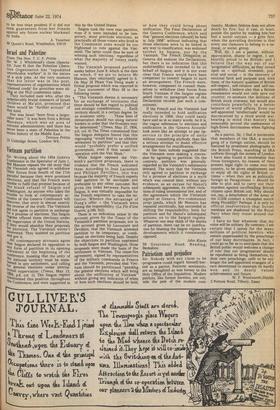Vietnam partition
Sir: Writing about the 1954 Geneva Conference in the Spectator of June I, Bill Manson repeats the old story that ,the Vietminh only agreed to withdraw their forces from South of the 17th Parallel because they were promised elections, and that the French were unable to fulfil that promise because of the blank refusal of Saigon and ,Washington. As anyone who takes the 'rouble to look at contemporary acCOunts of the Geneva Conference will discover, that story is almost exactly the reverse of the truth. The Vietminh did not agree to partition in exchange for a promise of elections. The Saigon regime offered them elections under he supervision of the United Nations, 11 they would abandon their proposals !Or partition. The Vietminh weren't interested. They insisted on partition sad got it.
All contemporary accounts agree that Saigon declared its opposition to sny form of partition in its opening statement at the beginning of the unference, insisting that the unity of national territory must be maintained in any settlement, and calling general elections under internatiicinal supervision. (Times, May 13, '954, p.6, col. 1). The Saigon regime
he this position throughout ne Conference, and were supported in this by the United States.
Saigon took the view that partition, even if it were intended to be temporary, must preclude elections, as practically all those voters who lived in the Communist zone would be too frightened to vote against the Vietminh. The latter could thus be sure of winning such 'elections,' regardless of what the majority of voters really wanted.
The Vietminh proposed partition weeks before June 9, which is the date on which, if we are to believe Mr Manson, they reluctantly agreed to it. On May 25 Pham Van Dong made a formal proposal which was reported in a Tass statement of May 26 in the following terms:
• "The Vietminh deems it necessary for an exchange of territories that there should be due regard to 'political and strategic considerations. .. Each territory should, in a certain degree, be an economic unity. . . . These lines of demarcation should run along natural borders in order that the 'frontiers may be determined." (Times, May 27, 1954, p.6, col. 4) The Times commented that the Saigon delegates feared that this regrouping "would lead to an ultimate settlement by partition" and that they would "probably prefer a unified government, even if that meant cooperation with the Viet Minh."
While Saigon opposed the Vietminh's partition proposals, there is evidence that the French welcomed them. According to Jean Lacouture and Philippe Devillers, this was because the majority of French experts held partition to be inevitable. and preferable to any other outcome. But given the links between Paris and Saigon, it was virtually impossible for the French negotiator to take the initiative. Whence the advantage of Dong's offer — the Vietminh were taking the responsibility. (La Fin dune Guerre, p.188, fn2).
There is no indication either in the account given by the Times of the Vietminh's partition proposals, nor in the account given by Lacouture and Devillers, that the Vietminh intended partition to be temporary, or conditional on elections being held. Despite the objections to partition expressed by both Saigon and Washington, those proposals were made the basis of the settlement in Vietnam. The cease-fire agreement, signed by representatives of the military commands in France and the Vietminh, provided that Vietnam should be partitioned "pending the general elections which will bring about the unification of Vietnam' without giving any indication of when or how such elections should be held, or how they could bring about unification. The Final Declaration of the Geneva Conference, which said that "general elections (should) be held in July 1956" without indicating that those elections were to be linked in any way to reunification, was endorsed neither by Saigon, nor by the Vietminh. The French Delegation at Geneva did endorse the Declaration; but there is no indication that this endorsement was intended to be on behalf of Saigon, and it is not even clear that France would have been competent to commit Saigon to such an arrangement. The French were, however, competent to commit themselves to withdraw their forces from South Vietnam if the Saigon regime asked them to; paragraph ten of the Declaration records just such a commitment.
If the French and the Vietminh had really intended to hold unification elections in 1956, they could easily have said so in so many words. As it is, the vague references to elections and unification in the 'Geneva Accords' look more like an attempt to pay lipservice to the principle of unity without committing anybody, than like a serious attempt to make effective arrangements for reunification.
At the time, nobody suggested that the Vietminh were making a concession by agreeing to partition. On the contrary., partition was generally regarded as the Vietminh's substantive demand. The story that the Vietminh only agreed to partition in exchange for a promise of elections is a myth which was created later, without any evidence, as an excuse for Hanoi's subsequent aggression, its other violations of ruling international law, and of the agreement which the Vietminh signed at Geneva. Pro-communist propz ganda, which Mr Manson has repeated uncritically, has succeeded in shifting the responsibility, both for partition and for Hanoi's subsequent actions, on to the Saigon regime. Whatever one may think of the merits of partition, there can be no justification for blaming the Saigon regime for developments which it consistently opposed.
John Kissin 36 Grosvenor Road, Reading, Berkshire.


































 Previous page
Previous page